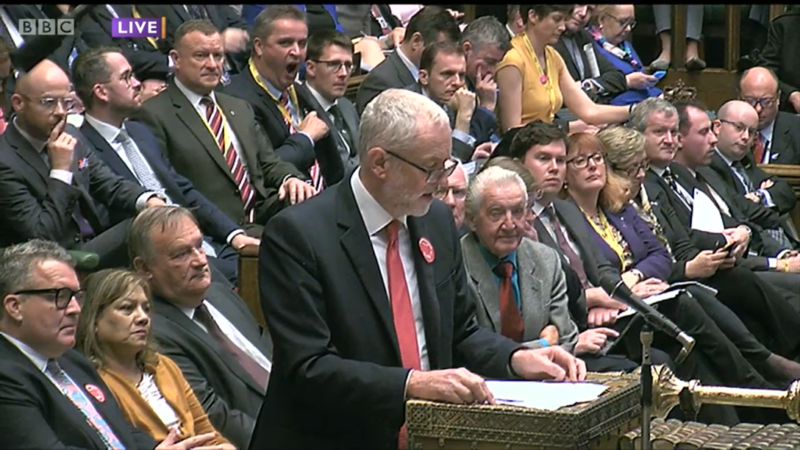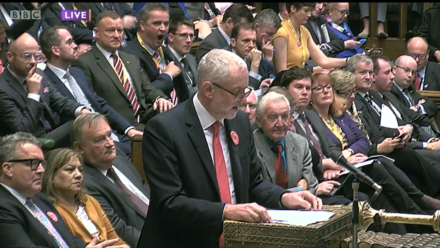

Westminster is dominated by debate over sexual misconduct but this was a debate in which some of the usual party political point-scoring was taken off the table.
This morning the labour movement was still reeling over the shocking account by Bex Bailey of being raped at a party event in 2011 but Jeremy Corbyn chose to concentrate on what he sees as tax avoidance being facilitated by the Isle of Man.
This might seem counter-intuitive but it was the right move because it would be distasteful and wrong to try to politicise Bailey’s appalling story of sexual violence.
Corbyn concentrated on the tiny Isle of Man where, he said, some 957 business jets were parked.
“It seems a bit excessive for any island, anywhere,” he said, in his somewhat nonchalant style.
The question took him into one of his favoured criticisms of Theresa May’s Tories, that they represent a rich elite whose leeching of the system drains vital resources from public services.
Gordon Brown’s government had taken action in 2010 to shut down a scheme on the island used to import yachts into the EU without paying tax – would HMRC now investigate these new claims “diligently”, Corbyn asked.
May is normally comfortable when trying to fend off an ambush-type question from Corbyn, because she likes to just bore her way through the trickiest parts, but today she looked rattled. She even resorted to quoting the record of her predecessor in Downing Street, even though she has made no secret of her disdain for the governing style of David Cameron’s chumocracy.
HMRC takes allegations of avoidance “seriously” and it is the agency’s “job” to collect more tax, the PM said in about as empty a non-answer as you can get.
When pushed, May rolled out the dubious stat the Tories had brought in nearly £160m in “additional compliance revenues” since 2010 – mainly through that chap Dave she wasn’t very keen on – and failed to mention that the tax gap remains stubbornly high at £34bn in Britain.
Oh dear. May just about broke out of the dry repetition that has seen her derided as an automaton but could not deliver a meaningful fightback. She claimed Labour blocked more anti-avoidance measures before the election but it seems a counter-intuitive line of attack. If voters dislike Corbyn it will not be because they see the veteran socialist as being in hock to big business and millionaires.
Today’s session could not be classed as a disaster for May but it showed, once again, that she cannot think on her feet. The sight of Philip Hammond – the chancellor she wanted to sack this summer – whispering answers to her before she stood to speak will crystallise for many her weakness: pitifully reliant on the colleagues who she dislikes but cannot remove.
The exchanges between Corbyn and May lacked a spark but Labour backbencher Lisa Nandy injected a more political element over the stories of sexual misconduct when she accused the prime minister of ignoring previous warnings from her about party whips using information about sexual abuse to demand loyalty from MPs.
Nandy is, of course, entitled to do this because she is motivated by concern for the welfare of those who have suffered abuse.
May faltered in her response but vowed to look back at the answers she gave as home secretary as well as declaring that individual allegations should always be taken to the police.
Many observers were not familiar with what Nandy was referring to but the Wigan MP promptly posted on Twitter details of her past warnings to May, as well as a link to a BBC documentary in which a Tory whip admitted obtaining information about MPs’ links to “small boys” in return for obedience.
It was a day in which both May and Corbyn were tasked with speaking for a nation appalled at the ordeal of Bex Bailey and shocked at the sprawling sex scandal around parliament that ranges from sexual assaults to misguided comments in bars.
May said she was “deeply concerned” about the allegations and said all party leaders had been invited to a meeting to discuss a new grievance procedure but she struggled to articulate the anger and bewilderment of the people at what they have learned about Westminster. Corbyn was, perhaps, more confident than his counterpart because he was clear what changes he wanted brought in – such as better protections, workplace trade unions and stronger procedures to support victims – but overall it was a subdued session. That is understandable given the horror of what is being revealed about our politics.




More from LabourList
Antonia Romeo appointed to lead civil service as new Cabinet Secretary
‘If Labour is serious about upskilling Britain, it must mobilise local businesses’
Stella Tsantekidou column: ‘What are we to make of the Labour Together scandal?’